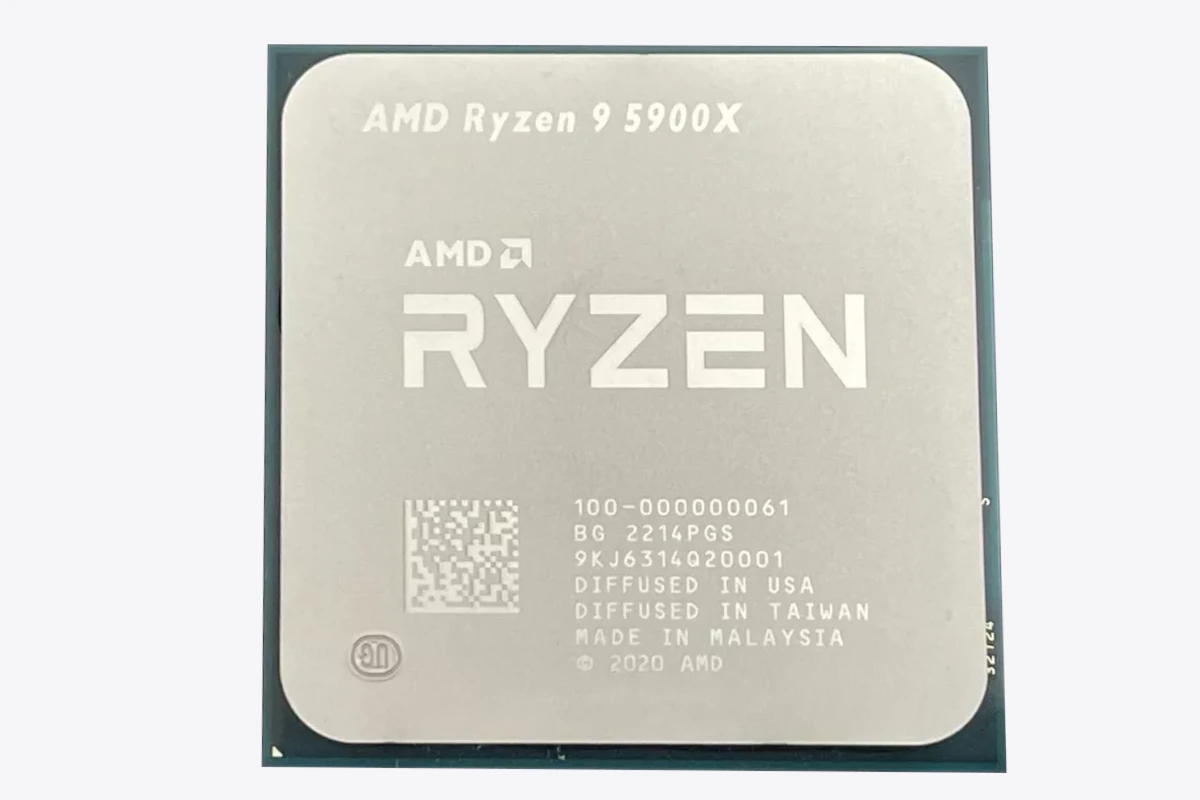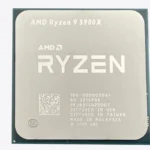The AM4 socket is one of the most successful and long-lived CPU platforms in modern PC history. Introduced by AMD in 2016, AM4 unified multiple processor generations under a single socket, making it a favorite among gamers, enthusiasts, and system builders. Even years after its debut, AM4 remains relevant thanks to its strong performance, wide compatibility, and excellent value.
AM4-Compatible CPUs List
| CPU Model | Cores | Base Clock | Boost Clock | Architecture | TDP |
|---|---|---|---|---|---|
| AMD A6-9500 | 2 | 3.5 GHz | 3.8 GHz | Excavator | 65 W |
| AMD A6-9500E | 2 | 3.0 GHz | 3.4 GHz | Excavator | 35 W |
| AMD A6-9550 | 2 | 3.8 GHz | 4.0 GHz | Excavator | 65 W |
| AMD A8-9600 | 4 | 3.1 GHz | 3.4 GHz | Excavator | 65 W |
| AMD A10-9700 | 4 | 3.5 GHz | 3.8 GHz | Excavator | 65 W |
| AMD A10-9700E | 4 | 3.0 GHz | 3.5 GHz | Excavator | 35 W |
| AMD A12-9800 | 4 | 3.8 GHz | 4.2 GHz | Excavator | 65 W |
| AMD A12-9800E | 4 | 3.1 GHz | 3.8 GHz | Excavator | 35 W |
| AMD Athlon 200GE | 2 | 3.2 GHz | — | Zen | 35 W |
| AMD Athlon 220GE | 2 | 3.4 GHz | — | Zen | 35 W |
| AMD Athlon 240GE | 2 | 3.5 GHz | — | Zen | 35 W |
| AMD Athlon 3000G (14nm) | 2 | 3.5 GHz | — | Zen | 35 W |
| AMD Athlon X4 940 | 4 | 3.2 GHz | 3.6 GHz | Excavator | 65 W |
| AMD Athlon X4 950 | 4 | 3.5 GHz | 3.8 GHz | Excavator | 65 W |
| AMD Athlon X4 970 | 4 | 3.8 GHz | 4.0 GHz | Excavator | 65 W |
| AMD Ryzen 3 1200 (14nm) | 4 | 3.1 GHz | 3.4 GHz | Zen | 65 W |
| AMD Ryzen 3 1200 (12nm) | 4 | 3.1 GHz | 3.4 GHz | Zen+ | 65 W |
| AMD Ryzen 3 1300X | 4 | 3.5 GHz | 3.7 GHz | Zen | 65 W |
| AMD Ryzen 3 2200G | 4 | 3.5 GHz | 3.7 GHz | Zen | 65 W |
| AMD Ryzen 3 3100 | 4 | 3.6 GHz | 3.9 GHz | Zen 2 | 65 W |
| AMD Ryzen 3 3200G | 4 | 3.6 GHz | 4.0 GHz | Zen+ | 65 W |
| AMD Ryzen 3 3300X | 4 | 3.8 GHz | 4.3 GHz | Zen 2 | 65 W |
| AMD Ryzen 3 4100 | 4 | 3.8 GHz | 4.0 GHz | Zen 2 | 65 W |
| AMD Ryzen 5 1400 | 4 | 3.2 GHz | 3.4 GHz | Zen | 65 W |
| AMD Ryzen 5 1500X | 4 | 3.5 GHz | 3.7 GHz | Zen | 65 W |
| AMD Ryzen 5 1600 (14nm) | 6 | 3.2 GHz | 3.6 GHz | Zen | 65 W |
| AMD Ryzen 5 1600 (12nm) | 6 | 3.2 GHz | 3.6 GHz | Zen+ | 65 W |
| AMD Ryzen 5 1600X | 6 | 3.6 GHz | 4.0 GHz | Zen | 95 W |
| AMD Ryzen 5 2400G | 4 | 3.6 GHz | 3.9 GHz | Zen | 65 W |
| AMD Ryzen 5 2600 | 6 | 3.4 GHz | 3.9 GHz | Zen+ | 65 W |
| AMD Ryzen 5 2600X | 6 | 3.6 GHz | 4.2 GHz | Zen+ | 95 W |
| AMD Ryzen 5 3400G | 4 | 3.7 GHz | 4.2 GHz | Zen+ | 65 W |
| AMD Ryzen 5 3500 | 6 | 3.6 GHz | 4.1 GHz | Zen 2 | 65 W |
| AMD Ryzen 5 3500X | 6 | 3.6 GHz | 4.1 GHz | Zen 2 | 65 W |
| AMD Ryzen 5 3600 | 6 | 3.6 GHz | 4.2 GHz | Zen 2 | 65 W |
| AMD Ryzen 5 3600X | 6 | 3.8 GHz | 4.4 GHz | Zen 2 | 95 W |
| AMD Ryzen 5 3600XT | 6 | 3.8 GHz | 4.5 GHz | Zen 2 | 95 W |
| AMD Ryzen 5 4500 | 6 | 3.6 GHz | 4.1 GHz | Zen 2 | 65 W |
| AMD Ryzen 5 4600G | 6 | 3.7 GHz | 4.2 GHz | Zen 2 | 65 W |
| AMD Ryzen 5 5500 | 6 | 3.6 GHz | 4.2 GHz | Zen 3 | 65 W |
| AMD Ryzen 5 5500GT | 6 | 3.6 GHz | 4.4 GHz | Zen 3 | 65 W |
| AMD Ryzen 5 5500X3D | 6 | 3.0 GHz | 4.0 GHz | Zen 3 | 105 W |
| AMD Ryzen 5 5600 | 6 | 3.5 GHz | 4.4 GHz | Zen 3 | 65 W |
| AMD Ryzen 5 5600F | 6 | 3.0 GHz | 4.0 GHz | Zen 3 | 65 W |
| AMD Ryzen 5 5600G | 6 | 3.9 GHz | 4.4 GHz | Zen 3 | 65 W |
| AMD Ryzen 5 5600GT | 6 | 3.6 GHz | 4.6 GHz | Zen 3 | 65 W |
| AMD Ryzen 5 5600T | 6 | 3.5 GHz | 4.5 GHz | Zen 3 | 65 W |
| AMD Ryzen 5 5600X | 6 | 3.7 GHz | 4.6 GHz | Zen 3 | 65 W |
| AMD Ryzen 5 5600X3D | 6 | 3.3 GHz | 4.4 GHz | Zen 3 | 105 W |
| AMD Ryzen 5 5600XT | 6 | 3.7 GHz | 4.7 GHz | Zen 3 | 65 W |
| AMD Ryzen 7 1700 | 8 | 3.0 GHz | 3.7 GHz | Zen | 65 W |
| AMD Ryzen 7 1700X | 8 | 3.4 GHz | 3.8 GHz | Zen | 95 W |
| AMD Ryzen 7 1800X | 8 | 3.6 GHz | 4.0 GHz | Zen | 95 W |
| AMD Ryzen 7 2700 | 8 | 3.2 GHz | 4.1 GHz | Zen+ | 65 W |
| AMD Ryzen 7 2700X | 8 | 3.7 GHz | 4.3 GHz | Zen+ | 105 W |
| AMD Ryzen 7 3700X | 8 | 3.6 GHz | 4.4 GHz | Zen 2 | 65 W |
| AMD Ryzen 7 3800X | 8 | 3.9 GHz | 4.5 GHz | Zen 2 | 105 W |
| AMD Ryzen 7 3800XT | 8 | 3.9 GHz | 4.7 GHz | Zen 2 | 105 W |
| AMD Ryzen 7 5700 | 8 | 3.7 GHz | 4.6 GHz | Zen 3 | 65 W |
| AMD Ryzen 7 5700G | 8 | 3.8 GHz | 4.6 GHz | Zen 3 | 65 W |
| AMD Ryzen 7 5700X | 8 | 3.4 GHz | 4.6 GHz | Zen 3 | 65 W |
| AMD Ryzen 7 5700X3D | 8 | 3.0 GHz | 4.1 GHz | Zen 3 | 105 W |
| AMD Ryzen 7 5800X | 8 | 3.8 GHz | 4.7 GHz | Zen 3 | 105 W |
| AMD Ryzen 7 5800X3D | 8 | 3.4 GHz | 4.5 GHz | Zen 3 | 105 W |
| AMD Ryzen 7 5800XT | 8 | 3.8 GHz | 4.8 GHz | Zen 3 | 105 W |
| AMD Ryzen 9 3900 | 12 | 3.1 GHz | — | Zen 2 | 65 W |
| AMD Ryzen 9 3900X | 12 | 3.8 GHz | 4.6 GHz | Zen 2 | 105 W |
| AMD Ryzen 9 3900XT | 12 | 3.8 GHz | 4.7 GHz | Zen 2 | 105 W |
| AMD Ryzen 9 3950X | 16 | 3.5 GHz | 4.7 GHz | Zen 2 | 105 W |
| AMD Ryzen 9 5900X | 12 | 3.7 GHz | 4.8 GHz | Zen 3 | 105 W |
| AMD Ryzen 9 5900XT | 16 | 3.3 GHz | 4.8 GHz | Zen 3 | 105 W |
| AMD Ryzen 9 5950X | 16 | 3.4 GHz | 4.9 GHz | Zen 3 | 105 W |
What Is the AM4 Socket?
AM4 (Advanced Micro Devices, Socket 4) is a CPU socket designed by AMD for its mainstream desktop processors. It replaced several older AMD sockets (AM3+, FM2+, etc.) and was created to support modern technologies such as:
- DDR4 memory
- PCI Express 3.0 and later 4.0
- Modern power efficiency standards
Physically, AM4 uses a PGA (Pin Grid Array) design, meaning the pins are located on the CPU rather than the motherboard.
Supported CPU Generations
One of AM4’s biggest strengths is the wide range of processors it supports. Over its lifespan, AM4 has powered multiple CPU families:
✅ Ryzen Processors (Zen Architecture)
- Ryzen 1000 series (Zen) – First-generation Ryzen CPUs
- Ryzen 2000 series (Zen+) – Improved clocks and efficiency
- Ryzen 3000 series (Zen 2) – Major IPC gains, PCIe 4.0 support
- Ryzen 5000 series (Zen 3) – Top-tier gaming and productivity performance
Notable CPUs include:
- Ryzen 5 3600 – A classic mid-range favorite
- Ryzen 7 3700X – Strong performance-per-watt
- Ryzen 9 5900X / 5950X – High-end workstation-class CPUs
- Ryzen 7 5800X3D – Legendary gaming CPU with 3D V-Cache
✅ APUs (CPUs with Integrated Graphics)
- Ryzen 2200G, 2400G
- Ryzen 3200G, 3400G
- Ryzen 4600G, 5600G, 5700G
These are popular for budget builds and compact systems.
Chipset Compatibility
AM4 CPUs work with a wide range of chipsets, though compatibility depends on BIOS support.
| Chipset | Typical Use Case |
|---|---|
| A320 | Entry-level systems |
| B350 / B450 | Budget and mid-range builds |
| X370 / X470 | Enthusiast features |
| B550 | Modern mainstream builds |
| X570 | High-end, PCIe 4.0 support |
⚠️ Important: Some older motherboards may require a BIOS update to support newer Ryzen CPUs.
Why AM4 Was So Popular
🔹 Long Platform Lifespan
AM4 lasted from 2016 to 2023+, supporting multiple CPU generations—something rarely seen in consumer platforms.
🔹 Excellent Upgrade Path
Users could upgrade from a Ryzen 1000 CPU to a Ryzen 5000 CPU without changing the motherboard (in many cases).
🔹 Great Price-to-Performance
AM4 CPUs often offer strong performance at lower prices, especially on the second-hand market.
🔹 Wide Availability
Motherboards, coolers, and CPUs are abundant and affordable.
AM4 vs AM5
AMD has now moved on to the AM5 socket, which supports:
- DDR5 memory
- PCIe 5.0
- Future Ryzen generations
However, AM4 still makes sense if:
- You want a cost-effective build
- You already own an AM4 motherboard
- You don’t need DDR5 or cutting-edge features
The Ryzen 7 5800X3D, in particular, allows AM4 systems to compete with much newer platforms in gaming.
Is AM4 Still Worth It in 2026?
Yes—for many users.
AM4 is ideal for:
- Budget and mid-range gaming PCs
- Productivity systems on a budget
- Upgrading older Ryzen builds
While AM5 is the future, AM4 remains one of the best-value platforms ever created.
Conclusion
The AM4 socket is a landmark achievement for AMD and PC builders alike. Its long lifespan, wide CPU compatibility, and strong performance have cemented its place in PC history. Whether you’re upgrading an older system or building a powerful budget PC, AM4 socket CPUs still deliver outstanding value.







